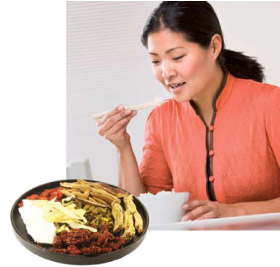After giving birth to her baby, a great amount of energy and reserve has been drained from the mother’s body. Therefore, a mother’s post-natal diet is crucial to help her heal and recover from the exertion of labour, as well as for the production of breast milk.
Most Malaysian mothers adhere to traditional confinement rules that have been passed down for generations. Different cultures have their own recommended confinement food choices. Read on to find out what experts have to say about some of these diets.
Jamu (medicinal herbs, roots and spices)
Traditional view: Jamu helps to keep the mother’s body warm, increase her energy levels, eliminate excess fats and toxins from the body, and shrink the uterus.
Doctor’s say: Currently, there are no detailed studies or evidence to prove the benefits of consuming Jamu post-natally, but experts do agree that the aroma of Jamu is certainly soothing and comforting when applied over the body. When it comes to oral consumption, do take heed of the quality and cleanliness of Jamu to avoid undesirable side effects.
Ginger
Traditional view: Ginger is considered a “hot” or “warming” food; it helps to promote blood circulation, prevent or relieve flatulence or wind, and strengthen the joints.
Doctor’s say: While studies show that ginger may help reduce nausea and vomiting during pregnancy, no studies has thus far supported it as a “warming” food. It is perfectly alright to use ginger as a spice in confinement foods, but consuming this tuber in large amounts may cause mothers to pass out “wind”. Rest assured that this wind is not from the joint or head, and has nothing to do with future backache or joint pain.
Ikan Haruan (snakehead fish)
Traditional view: Fish soups prepared from fresh ikan haruan has nourishing and healing properties that promote internal wound healing, especially for women who underwent Caesarean section.
Doctor’s say: Studies show that ikan haruan contains certain amino acids and fatty acids that are essential for wound healing. In general, foods high in protein (eg poultry, lean meat, fish, and dairy products) are all beneficial to speed up healing of cuts and wounds. New moms should include a variety of protein food sources to help her recover faster.
Chinese Herbs
Traditional view: Herbal soups prepared using specific traditional Chinese herbs, such as red dates, kei zhi (wolfberry) and dong guai (angelica), are said to help nourish blood, treat afterbirth symptoms such as prolonged discharge, and improve energy level.
Doctor’s say: There is no concrete evidence to show that Chinese herbs would benefit moms post-natally, but studies do show that these herbs exhibit antioxidant properties. Such effect may be helpful in promoting tissue healing and strengthening the immune system. Don’t overdose on herbs though, as antioxidants like vitamins C and E can be obtained naturally from fruits and vegetables.
Gourd Vegetables (eg bottle gourd and zucchini)
Traditional view: Helps to increase production of breastmilk.
Doctor’s say: There are no specific foods to increase the production of breast milk. However, keep the milk flowing, drink sufficient fluids to replenish lost fluids from your body. You also need to eat and rest well, so that you have the energy necessary for optimal milk production. Most importantly, keep on breastfeeding.
New Moms, Listen Up!
No matter which confinement dietary rules you are following during your confinement, it’s vital to eat a nourishing and wellbalanced diet to ensure optimum nutritional intake.
- Emphasise on good quality protein diet from fish, poultry, red meat, as well as legumes.
- Ensure your calcium intake from milk and milk products is adequate, especially if you’re breastfeeding.
- Include more fibre into your diet by consuming more fresh fruits and vegetables to prevent constipation.
- If your intake of quality food is limited, consider including vitamin and mineral supplements or nutritional beverages into your diet.
- Avoid caffeine, alcohol and nicotine if you’re breastfeeding.






Comments